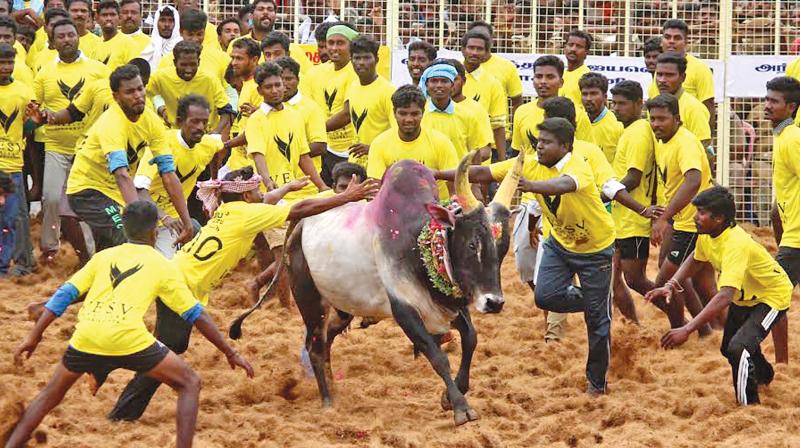No stay on Jallikattu, SC to examine if it can get constitutional protection

New Delhi: The Tamil Nadu government got a reprieve on Tuesday with the Supreme Court refusing to stay at this stage the Tamil Nadu government's law permitting Jallikattu in the state as a harvest festival during Pongal.
A bench of Justices Dipak Misra and Rohinton Nariman, while reserving orders on a batch of petitions challenging the law, indicated that a five-judge Constitution bench will examine whether Jallikattu can get constitutional protection as a 'traditional and cultural right’ under Article 29 (1).
Justice Nariman observed the interpretation of Article 29 (1) which says “Any section of the citizens residing in the territory of India or any part thereof having a distinct language, script or culture of its own shall have the right to conserve the same” will have extreme far reaching significance and importance.
While Attorney General KK Venugopal maintained that “any section of citizens” would not include the whole population (of Tamil Nadu).
Besides Animal Welfare Board, the Federation of Indian Animal Protection Organisations (FIAPO) and Compassion Unlimited Plus Action (CUPA) filed the present petitions.
The court said it would frame questions for adjudication by a larger bench, which will go into the legality of Jallikattu in Tamil Nadu as well as bullock cart races in Maharashtra. Regarding Kambala (bull race), the court said it would hear the matter after four weeks.
The Bench told counsel, "the question to be addressed is that whether Jallikattu can be allowed under the constitutional protection granted to certain tradition or as a cultural right; whether this right can be given constitutional recognition and whether the Tamil Nadu law amending the Prevention of Cruelty to Animals Act 1960 takes away the basis of 'prevention of cruelty' and if so whether can it be permitted.”
When petitioners insisted on interim stay, senior counsel Mukul Rohatgi appearing for Tamil Nadu said, “as a valid law has been passed by the State which has received President’s assent, no interim order can be passed at this stage.”
Rohatgi said Jallikattu is a state’s traditional and cultural right accepted under Article 29 (1), the ambit of which has not been examined by this court so far. The interpretation of this Article will have far reaching effect.
Rohatgi said by amending the law to remove Jallikattu from the ambit of PC Act, the State had not sanctified “cruelty”.
The State had passed rules to prevent cruelty of animals, like pouring chilli powers, piercing with a weapon, no liquor and no whipping etc.
Bulls are associated with every house and are given names and grown as a child. There are no fetters on the state to enact a law to give protection to the tradition being followed for over 2,500 years.
On behalf of the petitioners, senior counsel Siddharth Luthra, Anand Grover, V Giri and Shyam Divan submitted that the amendment to the Prevention of Cruelty to Animals Act, 1960 dated 23.01.2017 passed by the State of Tamil Nadu ultra vires the Prevention of Cruelty to Animals Act, 1960 and the Constitution of India.
The petitioners said this amendment is nothing but a surreptitious method of circumventing the law laid down by this court, without addressing the legal basis of the 2014 judgment banning Jallikattu. The amendment-dated 23.01.2017 has amended various Sections of the Prevention of Cruelty to Animals Act, 1960 and conduct of Jallikattu is allowed and to be governed by the rules framed by the State of Tamil Nadu.
The petitioners pointed out that only the Central Government is vested with the power to frame rules, and hence the rules framed under Section 3(2) of the Tamil Nadu Act are invalid and therefore inapplicable. It is clear that by bringing the amendment, the State of Tamil Nadu sought to overcome/circumvent the 2014 judgment.
It was argued that a binding judgment couldn’t be rendered ineffective by the enactment of legislation that substantially overrules the intended effect of the judgment.
By bringing a law, the state is attempting to circumvent the protection from cruelty granted to bulls under the Prevention of Cruelty to Animals Act.
The state amendment states that Jallikattu is vital to the preservation of the cultural and traditional practice in Tamil Nadu.
Refuting this. the petitioners contended that Jallikattu does not have any religious significance and in the opinion of this Court, it was also not supported by Tamil tradition and culture.
The very basis of Jallikattu was found to be cruel and ultra vires the Prevention of Cruelty to Animals Act, 1960, and for the State of Tamil Nadu to now propose that the event takes place in order to ensure the preservation of bull species is absurd, arbitrary and not tenable.
The amendment does not change the fact that Jallikattu is still a form of entertainment or sport and as such falls fouls of Section 11 of the PCA Act. It is therefore unconstitutional, illegal and invalid on the grounds that it directly contravenes central legislation in myriad ways, they argued and prayed for an interim stay of the law passed by the State till the disposal of the present petitions.

